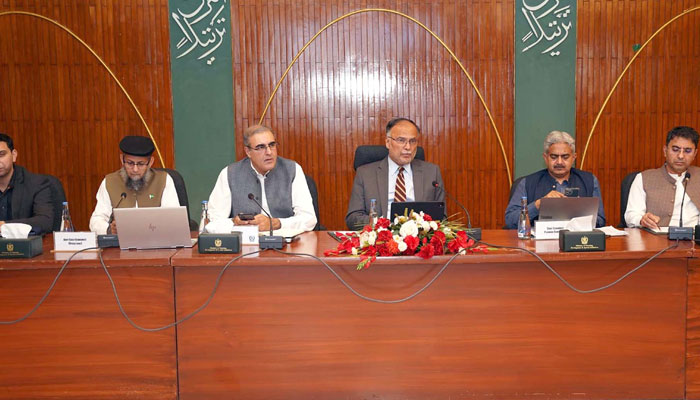Rs21bn higher education project sent to Ecnec for nod
Islamabad:The Central Development Working Party on Tuesday greenlit the revised Higher Education Development in Pakistan (HEDP) project, forwarding it to the Executive Committee of the National Economic Council for final approval.
With an updated price tag of Rs21.19 billion, the initiative aims to revamp and fortify the country’s higher education system, with a particular focus on tertiary institutions. Funded by the World Bank, the HEDP is designed to address persistent challenges in the sector, especially within affiliated colleges, which, alongside universities, constitute the backbone of the country’s tertiary education. While universities fall under the purview of the Higher Education Commission, affiliated colleges are jointly managed by universities and provincial governments.
Despite their wide reach and affordability, these colleges continue to struggle with issues like poor participation from underprivileged groups, weak industry-academic linkages, insufficient funding and systemic governance problems.
The revised project outlines a comprehensive reform agenda, with the aim to integrate modern technology into academic institutions, provide technical assistance for the development of effective higher education policies and enhance institutional capacity through improved regulation and innovative funding models. Also, HEDP emphasises the importance of robust project management and evaluation systems to ensure transparency and impact. The forum also approved the establishment of the National Centre for Quantum Computing with a project cost of Rs3.32 billion.
Under the plan, the centre will be developed across key institutions including HUB, UET main campus GIKI and NED University, Karachi. The project’s scope spans civil works such as HVAC systems and furnishing, the installation of cutting-edge quantum computing lab equipment, and training infrastructure. It also includes licensing, staffing, MS scholarships, international training opportunities and travel allowances, aiming to build institutional linkages and technical expertise in this emerging field.
Planning, development and special initiatives minister Ahsan Iqbal, who also serves as Deputy Chairman of the Planning Commission, said setting up a national quantum centre was critical to securing the nation’s technological independence and keeping pace with global advancements. He highlighted the game-changing potential of quantum computing in areas like cybersecurity, AI, drug discovery and climate forecasting.
"As major powers rapidly advance in this field, Pakistan must act to avoid strategic and technological lag," he said. The minister emphasised that Pakistan couldn't afford to fall behind in that strategic domain.
-
 Meghan Markle, Prince Harry Friends Suggest Their Marriage 'isn't All It Seems'
Meghan Markle, Prince Harry Friends Suggest Their Marriage 'isn't All It Seems' -
 Andrew Handed Out 'classified' Information To Jeffrey Epstein
Andrew Handed Out 'classified' Information To Jeffrey Epstein -
 Margot Robbie Recalls Wild Party Days And Getting Kicked Out Of Clubs
Margot Robbie Recalls Wild Party Days And Getting Kicked Out Of Clubs -
 NASA's Hubble Space Telescope Discovers ‘Dracula Disk', 40 Times Bigger Than Solar System
NASA's Hubble Space Telescope Discovers ‘Dracula Disk', 40 Times Bigger Than Solar System -
 Annular Solar Eclipse 2026: Where And How To Watch ‘ring Of Fire’
Annular Solar Eclipse 2026: Where And How To Watch ‘ring Of Fire’ -
 Zayn Malik Explains Past Comments About Not Being In Love With Gigi Hadid
Zayn Malik Explains Past Comments About Not Being In Love With Gigi Hadid -
 Internet Reacts To 10 Days Flight Ban Over El Paso
Internet Reacts To 10 Days Flight Ban Over El Paso -
 YouTube Music Tests AI-powered ‘Your Week’ Recap To Summarise Listening Habits
YouTube Music Tests AI-powered ‘Your Week’ Recap To Summarise Listening Habits -
 Kelly Clarkson Ready To Date After Talk Show Exit?
Kelly Clarkson Ready To Date After Talk Show Exit? -
 Is AI Heading Into Dangerous Territory? Experts Warn Of Alarming New Trends
Is AI Heading Into Dangerous Territory? Experts Warn Of Alarming New Trends -
 Google Updates Search Tools To Simplify Removal Of Non-consensual Explicit Images
Google Updates Search Tools To Simplify Removal Of Non-consensual Explicit Images -
 Chilling Details Emerge On Jeffrey Epstein’s Parties: Satanic Rights Were Held & People Died In Rough Intimacy
Chilling Details Emerge On Jeffrey Epstein’s Parties: Satanic Rights Were Held & People Died In Rough Intimacy -
 50 Cent Gets Standing Ovation From Eminem In New 'award Video'
50 Cent Gets Standing Ovation From Eminem In New 'award Video' -
 Bad Bunny Delivers Sharp Message To Authorities In Super Bowl Halftime Show
Bad Bunny Delivers Sharp Message To Authorities In Super Bowl Halftime Show -
 Prince William 'worst Nightmare' Becomes Reality
Prince William 'worst Nightmare' Becomes Reality -
 Thai School Shooting: Gunman Opened Fire At School In Southern Thailand Holding Teachers, Students Hostage
Thai School Shooting: Gunman Opened Fire At School In Southern Thailand Holding Teachers, Students Hostage




